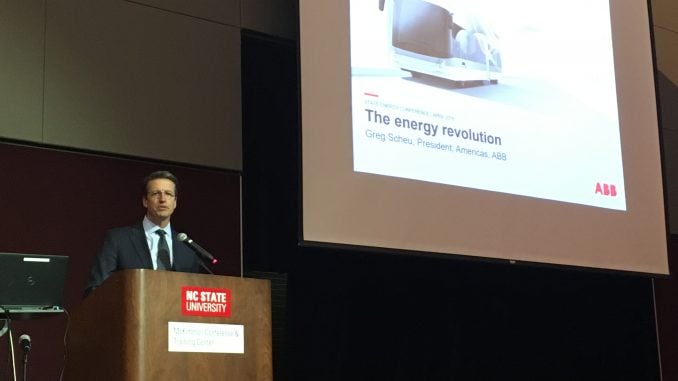
RALEIGH — Energy leaders provided insights on the progress, challenges and solutions of the energy sector at the State Energy Conference at NC State’s McKimmon Center last week.
Connecting more than 75 experts and around 800 attendees, the conference facilitated presentations and discussions about the future of energy in North Carolina.
Greg Scheu, the president of the Americas Regions for ABB and Wednesday’s keynote speaker, spoke about how much innovation in energy has happened in the past 10 years. He pointed to several examples: Solar Impulse, a solar-powered aircraft that traveled around the world; Formula E, an electric-powered race car, keeping up with Formula One; DC fast chargers that can recharge a car in less than 15 minutes; and a robot programmed in less than 17 hours to conduct an orchestra.
“We talk about change a lot, and change is happening more than I think we know or realize, because it’s happening right in front of our eyes,” Scheu said.
One change that garnered a lot of conversation is the rise of solar energy in the state. N.C. ranks No. 2 in the country for most installed solar generators. Finding solutions for the lack of reliability that comes with solar energy was a focus.
“That’s a real challenge for renewables,” Scheu said. “When does a sun go behind the cloud? How well can you predict weather in terms of energy reliability and predictability?”
Panelists offered solutions — one in the form of legislation. Rep. Dean Arp (R-Union) spoke about House Bill 589, which was passed last year and aims to change power grid connections, explore community solar and look into power storage. Arp explained the implementation will save the state $850 million over 10 years.
“Can you imagine the amount of solar we have in North Carolina if we can take in new technology that simply shifts that to other parts of the day that we store that and utilize that?” Arp said. “We would benefit from that in North Carolina so much because of the amount that we have.”
Casey Collins, the energy manager at Duke University, joined Arp in explaining the impact the bill would have on Duke University and North Carolina as a whole.
“We recognize that how we choose to procure our energy resources is at a scale that matters to North Carolina’s economy and certainly the environmental footprint associated with that energy,” Collins said.
Chris Doerfler, the founder of 3DFS Software-Defined Electricity in Pittsboro, offered some solutions when it comes to determining the problems that the energy sector faces, but he said more investments from institutions like the FREEDM Center at NC State are needed.
“I look at the FREEDM Center and NC State, and they are churning out all these great ideas,” Doerfler said. “But to see the path ahead of them without someone coming in to front a $50 million check — it’s going to be very, very difficult business to be in.”
Robert Sipes, vice president of the Western Carolinas Modernization Plan for Duke Energy, said his group has begun their largest battery storage projects.
“We got a community that is very interested in how the electricity they use is generated and distributed,” Sipes said. “Storage is not something new at Duke Energy. We’ve been doing this for a while.”
Sipes drew examples from the Mount Sterling microgrid and the Hot Springs battery system.
“Cases like these battery storage [systems] will be part of a solution for us to provide that cleaner and smarter and affordable future for our customers,” he said.
Scheu told the audience, “We’re in the midst of an energy revolution,” citing the shift to renewables, natural gas production surpassing coal, and nuclear staying stable.
“This is exciting in terms of what this means for sustainability,” Scheu said. “It also means that the various systems that control the grid have to be more resilient and more responsive.”
Next year’s State Energy Conference is April 30 to May 1, 2019.



